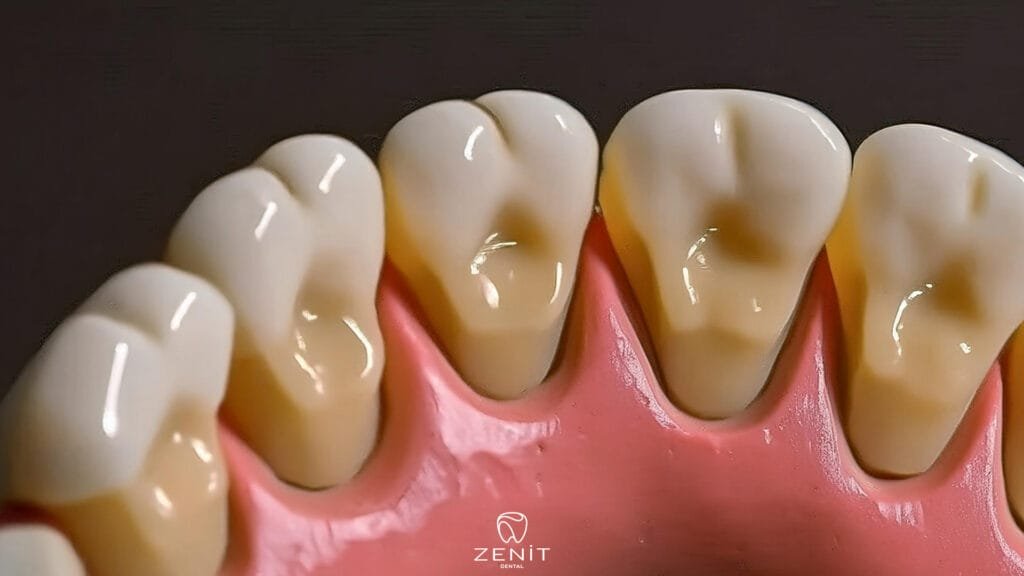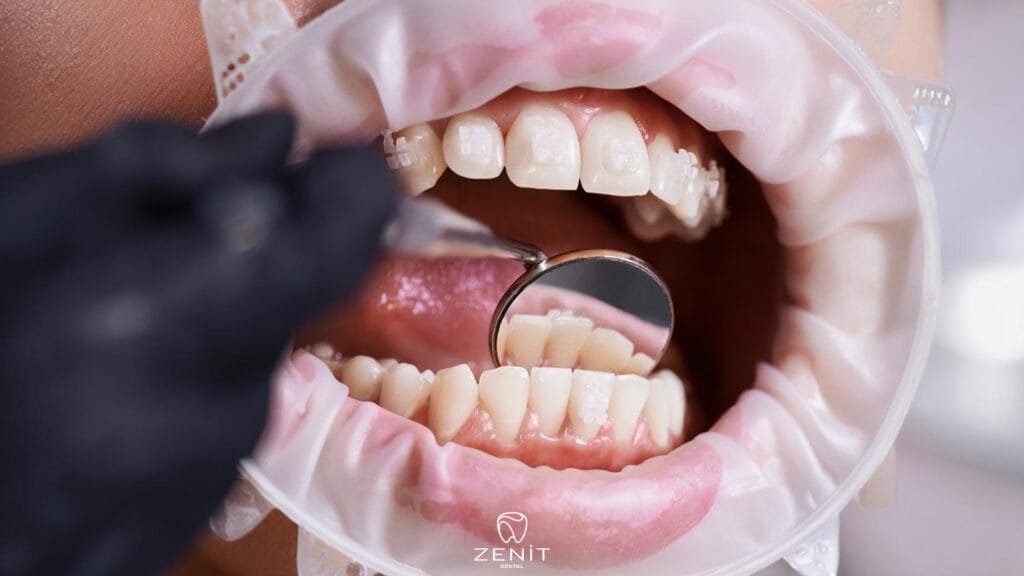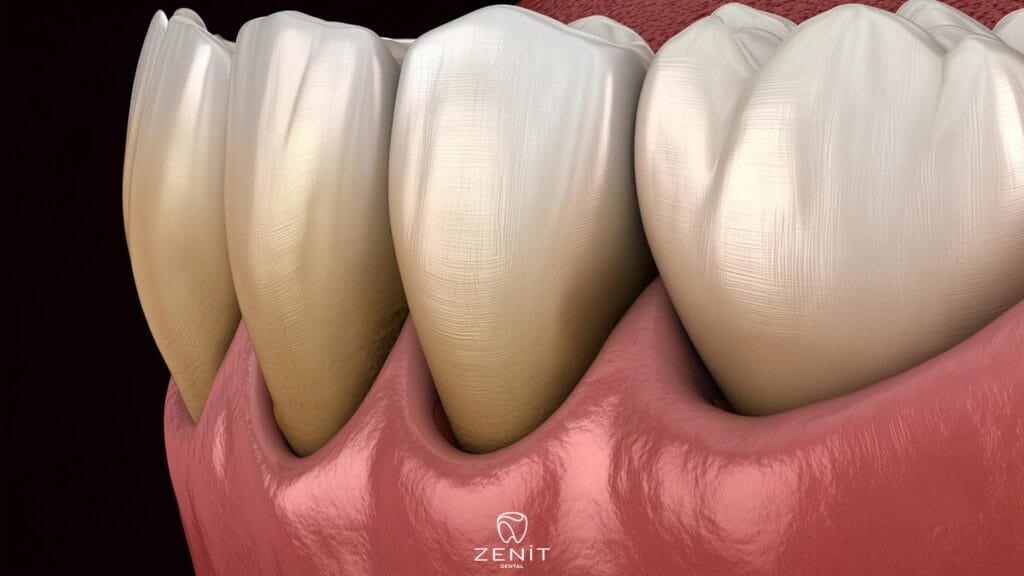What is a Periodontal Pocket?
Periodontal pocket is a serious condition that occurs in the advanced stages of gum disease. This occurs when the gums move away from the teeth and pocket-like spaces form between the gum line and the tooth. Normally, healthy gums surround the teeth tightly and protect the tooth roots. However, with the progression of periodontal diseases, this protective structure weakens and the gums begin to recede.
The pockets formed by gum recession provide an ideal environment for bacteria and plaque to accumulate. As the depth of these pockets increases, they become more difficult to clean and the risk of infection increases. Bacteria accumulate in these pockets, causing the infection to spread deeper and further damage the gum tissue. This process is made worse by inflammation caused by the immune system fighting the infection.
If left untreated, periodontal pockets can lead to gum and bone loss. The bone structure that supports the teeth may melt over time, causing the teeth to loosen and eventually lose. Early symptoms of periodontal disease include bleeding gums, swelling, redness and tenderness. In advanced stages, symptoms such as loose teeth, receding gums and bad breath may be observed.
How Does a Periodontal Pocket Form?
The main cause of periodontal pocket formation is gum disease. Gum disease usually begins with plaque buildup. Plaque is a sticky biofilm containing bacteria that accumulates on the surface of the teeth. If plaque is not removed regularly, it hardens over time and tartar (calculus) forms. Tartar accumulates below the gum line, irritating the gums and causing them to become inflamed. This inflammation leads to early-stage gum disease called gingivitis. Symptoms of gingivitis include bleeding gums, redness and swelling.
If left untreated, gingivitis can progress to a more serious condition called periodontitis. During periodontitis, inflammation spreads below the gum line and affects the bone and connective tissue that support the teeth. During this process, the gums move away from the teeth and periodontal pockets are formed. As these pockets get deeper, more bacteria and plaque accumulate, increasing infection and inflammation.
Periodontitis can cause serious damage to the gums and bone structure that supports the teeth. This damage can lead to loosening and eventual loss of teeth. Periodontal pockets play a major role in this process. As the pockets get deeper, they become harder to clean, causing bacteria and toxins to accumulate. This buildup causes the immune system to continually respond with inflammation, resulting in further damage to tissues and bones.
Regular dentist check-ups and professional teeth cleaning are important to prevent periodontal pocket formation. Early diagnosis and treatment of gum disease can help prevent serious complications. To ensure dental hygiene, it is recommended to brush your teeth daily, use dental floss and use mouthwash. Additionally, a healthy diet and avoiding smoking are also important factors in maintaining gum health.

How to Identify a Periodontal Pocket?
Periodontal pocket symptoms usually start mild and become more pronounced as the disease progresses. Symptoms may include:
- Redness and swelling of the gums
- Gum sensitivity and bleeding
- Bad breath (halitosis)
- Loosening or loosening of teeth
- gum recession
- Pain while chewing
Periodontal Pocket Treatment
Treatment of periodontal pockets varies depending on the depth of the pockets and the severity of the disease. In the early stages, treatment may be less invasive, while in advanced stages, surgery may be required.
Scaling and Root Planning
In the early stages, the first step in treating gum disease is often scaling and root planning. This procedure removes plaque and tartar from the surface of the teeth and smoothes the surfaces of the tooth roots, making it more difficult for bacteria to reaccumulate. This procedure is usually done under local anesthesia and may require more than one appointment.
Antibiotic Treatment
In some cases, antibiotics may also be used to treat periodontal pockets. Antibiotics can be used both systemically (by mouth) and topically (applied directly to the pockets) to control bacterial infection.
Surgical intervention
In advanced stages, when the depth of the pockets and bone loss reaches serious levels, surgical intervention may be required. Surgical methods may include:
- Flap Surgery (Gingival Flaps): In this procedure, the gums are folded back to reduce the depth of the gum pockets, the root surfaces are cleaned, and then the gums are placed back in place.
- Bone Graft: Natural or synthetic bone materials are used to regenerate lost bone tissue.
- Tissue Graft: In case of receding gums, a soft tissue graft can be applied to reshape the gums and close the pockets.
How Do We Protect Our Gum Health?
In order to prevent the formation of periodontal pockets and protect your general oral health, it is of great importance to pay attention to oral hygiene and not to skip regular dentist checks. Here are some tips to protect your periodontal health:
Regular Brushing and Flossing
Brush your teeth with fluoride toothpaste twice a day, in the morning and in the evening. Gently clean your gums and teeth, paying attention to the gum line while brushing. Brushing time should be at least two minutes. Also, prevent plaque buildup between your teeth by flossing daily. Dental floss helps clean the plaque between the teeth that the toothbrush cannot reach, thus reducing the risk of periodontal disease.
Mouthwashes
You can keep the oral bacteria level under control by using antibacterial mouthwashes. Mouthwashes are an important part of oral hygiene, helping to reduce plaque formation and freshen breath. However, remember that mouthwashes do not replace brushing and flossing; These products complement your routine oral care.
Balanced diet
Follow a balanced and healthy diet to protect your gum health. You can protect your teeth and gums by avoiding sugary and acidic foods. Sugary foods accelerate the formation of plaque on the teeth, and acidic foods can damage tooth enamel, leading to tooth decay and gum disease. Instead, be careful to consume fiber-rich foods that are rich in vitamins and minerals. Vitamin C, in particular, is important for gum health and is effective in protecting against gum diseases by strengthening the immune system.
Regular Dentist Check-ups
Visit your dentist every six months for a professional cleaning and detect possible gum diseases at an early stage. Regular dentist checkups play a critical role in maintaining your oral health. Your dentist evaluates the condition of your teeth and gums, diagnoses possible problems early and applies the necessary treatments. Professional cleaning procedures reduce the risk of periodontal disease by removing plaque and tartar accumulation on the tooth surface.
Avoiding Cigarettes and Tobacco Products
Cigarettes and tobacco products are one of the important risk factors for periodontal diseases. Smoking damages gum tissues, increasing the risk of inflammation and slowing down the healing process. Tobacco use also causes harmful bacteria to multiply in the mouth and paves the way for gum diseases. For healthy gums, stay away from cigarettes and tobacco products.
Reducing Stress
Stress can weaken your immune system, increasing the risk of periodontal disease. You can protect your overall health and oral health by applying stress management techniques. Methods such as regular exercise, meditation, yoga and adequate sleep can help reduce your stress levels.
By following these tips to protect your periodontal health, you can contribute to the prevention of gum diseases. Regular oral care and dentist check-ups are indispensable for a healthy mouth and a beautiful smile.

Periodontal pockets are a serious symptom of gum disease and, if left untreated, can lead to serious problems including tooth loss. Therefore, it is of great importance to pay attention to oral hygiene, not to skip regular dentist checks, and to take the necessary precautions by noticing the signs of gum diseases early. Taking preventive measures for healthy gums and teeth will help you protect your oral health in the long run.






